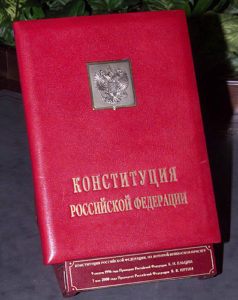
President Putin’s proposed amendments to the Russian constitution have received a lot of attention. Leaving politics aside, let’s look at the language and style of an introductory paragraph.
«Российская Федерация, объединенная тысячелетней историей, сохраняя память предков, передавших нам идеалы и веру в бога, а также преемственность развития российского государства, признает исторически сложившееся государственное единство».
Here’s my quick attempt at a translation:
“The Russian Federation, united by a thousand years of history, preserving the memory of its ancestors, who passed on to us their ideals and faith in God, as well as the continuity of the development of the Russian state, recognizes the historically formed unity of the state.”
Pretty clumsy. Here’s an alternative from meduza.io:
“The Russian Federation, united by a thousand-year history and in testament to the memory of its ancestors, who gave us our ideals and our faith in God as well as the continuous development of the Russian state, recognizes this historically formed governmental unit.”
Not much better! Perhaps it’s because the text we’re working with is none too elegant to begin with. In an article on Сноб, philologist Mikhail Epstein gives it a barely passing grade: “If I came across such a phrase in a school composition, it’d deserve a C- at best.” Ouch.
Epstein highlights several problems:
- “передавших… преемственность” – if преемственность (continuity, succession) is something that’s inherently passed on, why mention that it’s been passed on? Epstein’s biting response: “передать преемственность” — это передать передачу того, что передается в ходе передачи.” (Something like “transmitting a transmission of what’s being transmitted in the course of the transmission.”)
- Redundant repetition of three repeated (ahem) lexical ideas: история — исторически (history – historical), государство — государственное (state as a noun, and as an adjective), объединенное — единство (united – unity). The Russian state has been “united by history in a historical unity.”
- Overuse of participles can lead to a heavy style; here we have three participles to a single verb.
Epstein concludes: “Frozen language, frozen thought, and in all – under the guise of basis for the constitution – a verbose absurdity.”
But let’s not be too harsh on participles. Besides helping you plow through heavy bureaucrat-ese, they’ll also help you enjoy Boris Akunin, Lyudmila Ulitskaya, Pasternak and Chekhov – whoever your favorite writers are.
If you’d like to work on your participles, consider my online course on participles. You can try a free sample lesson, or join the Russian Grammar Library for full access to all the materials on the site – over 180 interactive videos, most with additional exercises and example sentences.
Have you ever encountered ponderous Russian that baffled you, or just tried your patience? Leave a comment below or get in touch!
Image credit: Kremlin.ru / CC BY (https://creativecommons.org/licenses/by/3.0)
